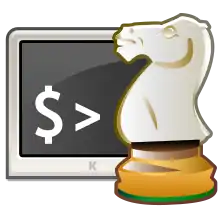Chess and computers
Chess and computers have been connected since the earliest days of the computer. In the 19th century Charles Babbage had thought of the idea,[1]p87 and in the 20th century Alan Turing, the mathematician and Bletchley Park codebreaker, put some thought into the idea. He was not a very good chess player, but was one of the creators of the first British computer.[2][3]

There are two types of chess programs. One are chess engines that play against an opponent. And the other one are chess databases that help the user become a better player. The two types can be made to work together, though they have different functions and work in different ways.
Chess engines
Chess engines are computer programs that can play chess games against human opponents. Many have been created; they can play at master level, though their processes are quite different from those of a human being.[1]p87 The best engines on the fastest computers have won matches against former chess world champions Kasparov and Kramnik,[4] but the software can be used at an easier level for a learner.
Competitions are run by putting engines against each other, and the results are published. At all times and live over the Internet are broadcast the Top Chess Engine Championship and the Chess.com Computer Chess Championship. Although they are made for entertainment, their engine ratings are quite good.
However, for very good engine ratings (they are called 'statistically significant') a huge amount of chess games needs to be played. Such results are provided by rating lists. Here are a few links to them:
- Computer Chess Rating Lists 40/15 Archived 2020-11-11 at the Wayback Machine
- Chess Engines Grand Tournament 40/20
- FastGM's Rating List 60"+15'
Best chess engines
As of 2023, the best chess engines are Stockfish and Dragon by Komodo. Very good is also Leela Chess Zero. However, the Leela engine needs a powerful GPU.
On-line playing sites
Lichess is a website where players of all play strengths are welcome and can play against each other. Registration and use is not charged. It has also apps for various mobile telephones.
There are also websites which a player can join for a fee and play on line. Here, the subscriber will play against other subscribers, not a computer. All standards of players are amongst the members, and various events are on offer at different rates of play. The two leaders in this market are:
Chess databases
Chess databases do not actually play. They give access to the recorded history of master chess. There are two components. First, there is the software, which lets one search and organise the database material. Then there is the actual database, typically one to four million games.
In practice, databases are used for two purposes. First, for a player to train his/her ability at specific openings. Second, to look up specific opponents to see what they play, and prepare against them beforehand.
Using databases is one way that young players can achieve mastery at an early age.
ChessBase
ChessBase is the biggest database, and widely used by masters. Although it can be used online, most users download the software and data onto their laptop. Then they take the laptop to tournaments, to help prepare for games. Players may not use computers or any other aid during games, but much preparation goes on behind the scenes. ChessBase has to be purchased, and it is not cheap.[7]
New in Chess
This is a Dutch magazine for advanced players, which runs an on-line database called NicBase as part of its services. NicBase is free, and has over a million games.[8]
Chessgames
Chessgames.com runs an on-line database of games. It is partly free, but requires registration. Full access to all its facilities is by a fairly modest subscription. It has over half a million games on its database.[9]
References
- Hooper D. and Whyld K. 1992. The Oxford companion to chess. 2nd ed, Oxford University Press.
- Copeland, B. Jack (ed) 2006. Colossus: the secrets of Bletchley Park's codebreaking computers. Oxford University Press.
- Hinsley F.H. and Stripp A. (eds) 1993. Codebreakers: the inside story of Bletchley Park. Oxford.
- "Chess champion loses to computer". 5 December 2006 – via news.bbc.co.uk.
- "The Internet Chess Club". Internet Chess Club. Retrieved 2010-05-25.
- "Playchess". ChessBase. Archived from the original on 2011-02-24. Retrieved 2010-05-25.
- "Chess News - ChessBase". en.chessbase.com.
- "NicBase". Archived from the original on 2010-04-02. Retrieved 2010-04-08.
- "Chessgames.com: Chess Games Database & Community". www.chessgames.com.